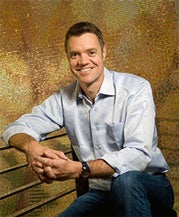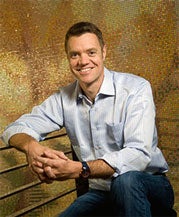 KINGSTON, R.I., March 21, 2016—About 10,000 Americans a day turn 65, and that increase in the aging population is bringing greater demand for products and services for older adults.
KINGSTON, R.I., March 21, 2016—About 10,000 Americans a day turn 65, and that increase in the aging population is bringing greater demand for products and services for older adults.
No one seems to know that better than Stephen Johnston, co-founder of Aging 2.0, a San Francisco-based accelerator for startups that improve the lives of the elderly by connecting business, technology and designers to the senior care industry.
Johnston will bring his expertise to the University of Rhode Island for the annual Thewlis Lecture on Gerontology and Geriatrics Wednesday, April 6 at 7 p.m. in Edwards Hall, 64 Upper College Road, on the Kingston campus. The talk, “Innovative Thinking: The Application of Technology to Aging,” is free and open to the public. A reception will be held at 6 p.m., before the lecture.
Johnston is also the featured speaker at the aging and innovation forum, also on April 6, from 1 to 3 p.m. in the Multicultural Student Services Center, 74 Lower College Road on the Kingston campus. Students and faculty will learn about entrepreneurship activities on campus and brainstorm about ways to bring new products to older consumers through technology and innovation.
The forum is free and open to the public and hosted by the program in gerontology and Melanie Brasher, assistant professor in the departments of sociology and anthropology and human development and family studies.
Among the panelists are James Miller, professor of ocean engineering and coordinator of the engineering entrepreneurship minor at URI; Karim Boughida, dean of libraries at URI; and Kunal Mankodiya, assistant professor of biomedical, electrical and computer engineering at URI.
Johnston—in addition to being co-founder of Aging 2.0—is co-founder of the Innovation Leaders Fund and co-author of Growth Champions, a book about sustainable corporate growth.
He has a master’s degree in economics from Cambridge University and a master of business administration from Harvard Business School, where he was a Fulbright Scholar.
URI chatted with him recently about his work, the growing aging population and how to make the lives of elderly people more comfortable.
What’s your talk about?
It’s about two things. First, how the demographic transition that we’re going through is more than just a cause of alarm and panic about the graying of the world and spiraling health care costs, but also an incredible multifaceted opportunity that can become a new driver of growth, employment and social cohesion. At the same time that we have this unprecedented demographic change we’ve got exponential technology growth transforming industries and much-needed health care transformation. I’ll also discuss a number of the new technologies we’re seeing across our global Aging 2.0 network, and some practical recommendations and next steps for everyone to get involved with innovation.
You’re an investor. How did you get interested in helping older adults?
I started off my career helping build transatlantic trade networks in Brussels working with the European Commission and U.S. Department of Commerce. After an M.B.A. and stint in mobile technology I got involved with a wealthy family impacted by dementia and struggling to find products and services to help them cope. That made me realize there was a lot of technology and services out there but few innovators were focused on this important and growing topic. I wanted to create a socially focused network that connects the best innovators with the needs of older people and the companies that serve them. It’s not only good business but it’s deeply satisfying working on problems that impact millions of people.
I read something about a startup making garments that use airbag technology to reduce injuries from falls, like broken hips. Any other clever ideas?
There are so many great ideas it’s hard to pin them down to just a few. The airbag on the hip idea, made by a Pennsylvania-based startup called Active Protective, is a great example as it combines the latest technology with immediate impact to improve people’s lives. We’re also seeing great ideas where the latest “hot” tech sectors with robots, wearables and smart homes intersect, such as Jibo, a social robot out of the Massachusetts Institute of Technology, CarePredict, a wearable device that looks more likely jewelry than the traditional pendant alerts, and Cubigo, a Dutch startup that creates a dashboard to bring local services and communications to the home in a good-looking, easy-to-use way.
Any advice for URI students who want to become entrepreneurs?
Everyone has his or her own path. For me, it was finding an intersection between doing something I loved, felt worthwhile doing and was good at. It’s generally a long slow road being an entrepreneur, punctuated with highs and lows, so you need to love what you’re doing and be prepared to make it your life’s mission. We’re four years old, but I still feel we’re just starting out and have a long way to go, so find people to work with who you can see yourself being with for the long haul.
Christine Ferrone, program manager of the Rhode Island Geriatric Center, says the talk is open to people on and off campus: “We are thrilled to bring the aging experience to our campus community and hope these events will spark the interprofessional collaborations so essential to improving the quality of life for all of us as we age. We welcome everyone to attend.”
Dr. Malford W. Thewlis, a former resident of Wakefield, was a pioneer in the field of geriatric medicine and one of the founders of the American Geriatrics Society in 1942. Dr. Thewlis wrote The Care of the Aged: Geriatrics, which was first published in 1919 under the title, “Geriatrics: A Treatise on the Prevention and Treatment of Diseases of Old Age and the Care of the Aged.”
In honor of Dr. Thewlis, URI established the Malford Thewlis Lecture in Gerontology and Geriatrics in 2006. The goal of the annual event is to raise awareness, enhance knowledge and stimulate discussion about issues related to aging, longevity and health care for older adults.
For more information, visit the Geriatric Education Center’s website. Registration is not required for the lecture, but is requested by calling Ferrone at 401-874-7846 or emailing her at cferrone@uri.edu.
Johnston’s visit is sponsored by the URI Program in Gerontology, the Rhode Island Geriatric Education Center, the Institute for Integrated Health and Innovation, a part of the URI Academic Health Collaborative; URI Business Development Center, URI Office of the Provost, and URI’s College of Human Science and Services.
Pictured above: Stephen Johnston, co-founder of Aging 2.0, a San Francisco-based accelerator for startups that improve the lives of older adults by connecting business, technology and designers to the senior care industry. Photo courtesy of Stephen Johnston.

